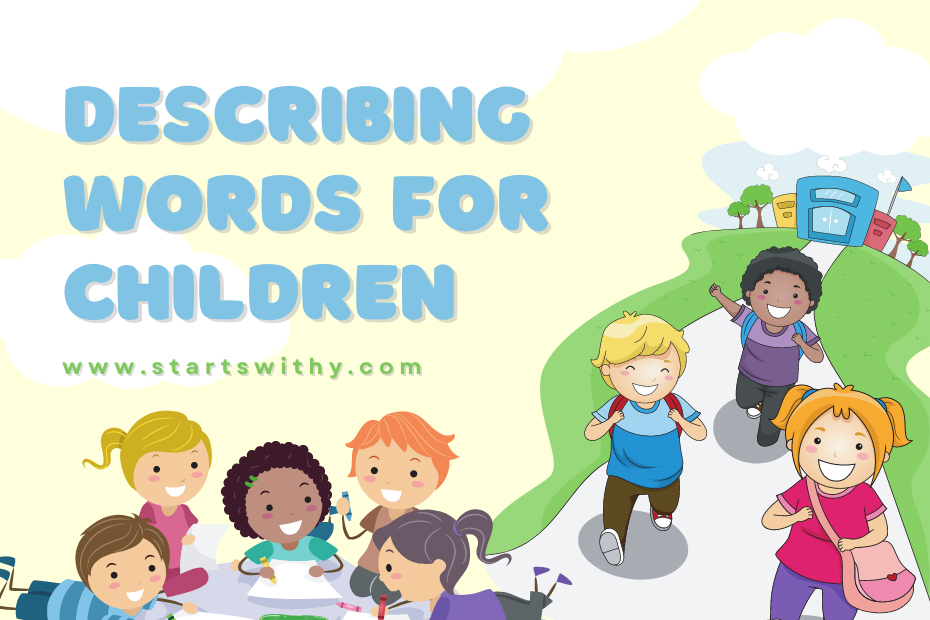How to Describe Children? – Different Scenarios
When it comes to describing children, there are various scenarios that we encounter. As a preschool teacher, it is important to have a wide range of adjectives at our disposal to accurately describe children in different situations. In this section, I will provide you with some tips and examples on how to effectively describe children in various scenarios.
1. Describing a child’s appearance:
When describing a child’s appearance, it’s important to use words that are positive and age-appropriate. Here are some adjectives that can be used to describe a child’s appearance:
- Adorable: The child has a charming and lovable appearance.
- Cute: The child has a pleasant and endearing look.
- Energetic: The child has a lively and active appearance.
- Bright-eyed: The child has alert and lively eyes.
- Rosy-cheeked: The child has flushed and healthy-looking cheeks.
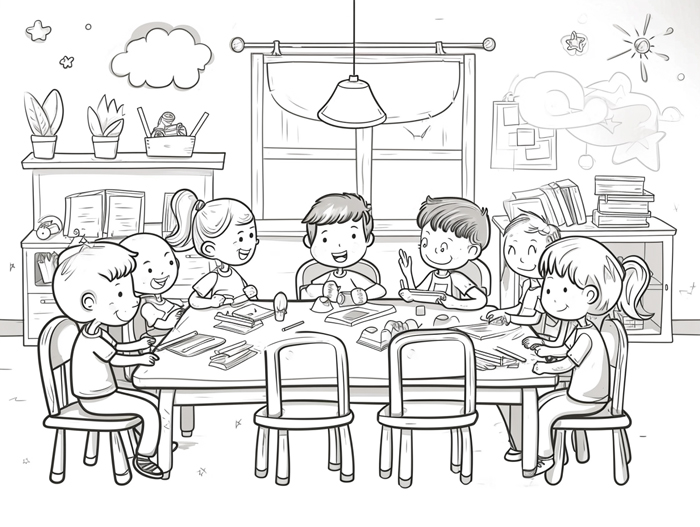
2. Describing a child’s behavior:
When describing a child’s behavior, it’s important to be specific and descriptive. Here are some adjectives that can be used to describe a child’s behavior:
- Curious: The child is eager to learn and explore.
- Polite: The child is well-mannered and respectful.
- Playful: The child enjoys engaging in imaginative and lively activities.
- Helpful: The child is willing to assist and support others.
- Independent: The child is self-reliant and capable of doing tasks on their own.
3. Describing a child’s personality:
When describing a child’s personality, it’s important to highlight their unique traits and characteristics. Here are some adjectives that can be used to describe a child’s personality:
- Kind: The child is caring and considerate towards others.
- Creative: The child has a vivid imagination and enjoys expressing themselves artistically.
- Confident: The child believes in their abilities and is self-assured.
- Curious: The child has a strong desire to learn and discover new things.
- Friendly: The child is sociable and enjoys making friends.
Describing Words for Children in English
When it comes to describing children in English, it’s important to choose words that are positive, age-appropriate, and reflect their unique qualities. In this section, I will provide you with a variety of adjectives that can be used to describe children in different scenarios. Whether you’re a preschool teacher introducing new words or a parent looking to expand your child’s vocabulary, these descriptive words for children will come in handy.
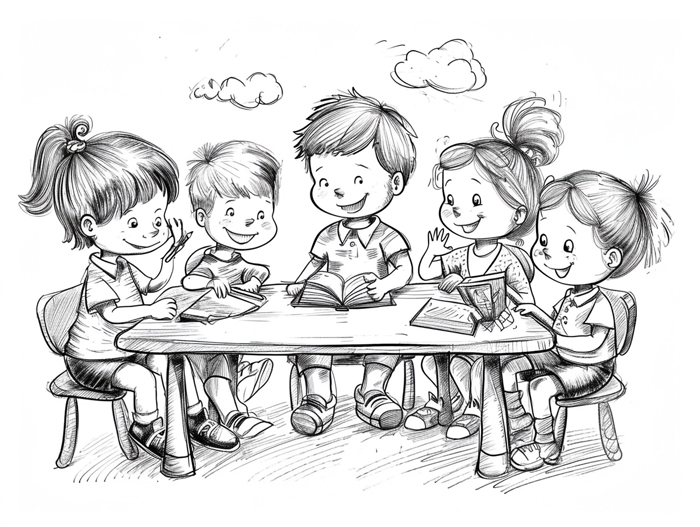
Appearance:
- Cute: Children often have adorable features that make them irresistibly cute.
- Energetic: Their appearance can exude a vibrant and lively energy.
- Expressive: Their faces may be full of expressions, conveying a range of emotions.
- Bright-eyed: Their eyes are often bright and filled with curiosity.
- Smiley: Children have the ability to light up a room with their infectious smiles.
Behavior:
- Playful: Children love to engage in fun and imaginative play.
- Helpful: They often seek opportunities to lend a hand and be of assistance.
- Curious: Children have a natural curiosity that drives them to explore and learn.
- Cooperative: They show a willingness to work together and get along with others.
- Enthusiastic: Children approach activities and experiences with enthusiasm and excitement.
Personality:
- Creative: Children have vivid imaginations and a knack for expressing themselves artistically.
- Kind: They display empathy and compassion towards others.
- Inquisitive: Children ask many questions and have a desire to understand the world around them.
- Resilient: They demonstrate the ability to bounce back from setbacks and adapt to new situations.
- Confident: Children can be self-assured and believe in their own abilities.
Remember, when describing children, it’s essential to choose words that uplift and inspire. By using positive and age-appropriate language, we can encourage their self-esteem and promote their overall well-being.
Adjectives for Children
As a preschool teacher, I know how important it is to teach children a wide range of vocabulary, including descriptive adjectives. Using adjectives to describe children can help them develop a strong sense of self and expand their understanding of the world around them. In this section, I will provide you with a list of positive adjectives for children, followed by some examples of negative adjectives. Let’s dive in!
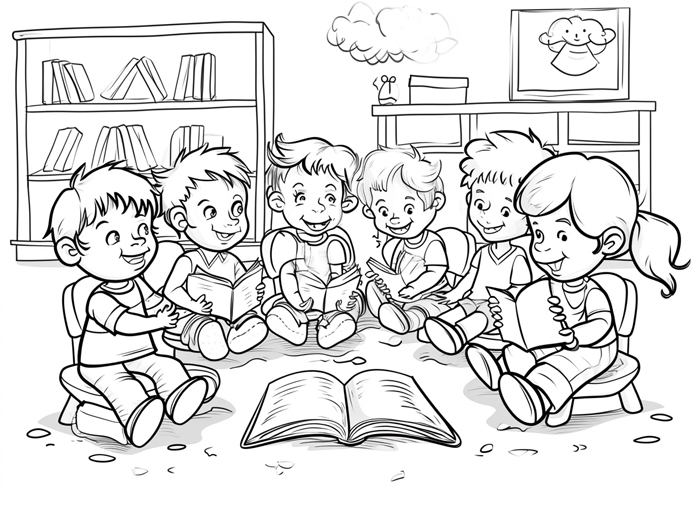
Positive Adjectives for Children with 12 Example Sentences
It’s essential to use positive adjectives when describing children, as it helps to build their self-esteem and encourages them to embrace their unique qualities. Here are twelve positive adjectives that you can use to describe children:
| Adjective | Definition | Example Sentence |
|---|---|---|
| Creative | Having the ability to think outside the box | My child is creative and loves to draw imaginative pictures. |
| Confident | Feeling sure of oneself | I am proud to see my student stand up and speak confidently. |
| Energetic | Full of energy and enthusiasm | The children in my class are always energetic and eager to learn. |
| Funny | Humorous and able to make others laugh | He can be funny at times, always making his classmates giggle. |
| Helpful | Willing to assist others | She is always helpful, lending a hand to her friends when they need it. |
| Playful | Enjoying playtime and having fun | They love being playful, often engaging in imaginative games together. |
| Kind | Showing a friendly and caring nature | My student is kind and compassionate towards others. |
| Curious | Eager to learn and explore | The children in my class are curious and ask thought-provoking questions. |
| Brave | Showing courage in the face of challenges | He is brave and never backs down from trying new things. |
| Loving | Expressing affection and care | She has a loving nature and always shares hugs with her friends. |
| Polite | Displaying good manners and respect | They are polite and always say “please” and “thank you.” |
| Intelligent | Possessing the ability to think and understand complex ideas | My child is intelligent and quickly grasps new concepts. |
Remember, when using these adjectives, make sure to tailor them to the child you are describing and provide specific examples to illustrate their qualities.
Negative Adjectives for Children with 5 Example Sentences
While it’s important to focus on positive adjectives, it’s also necessary to be aware of negative adjectives and the impact they can have on a child’s self-esteem. Here are five negative adjectives to be cautious of:
- Disobedient: Not following rules or instructions.
- Lazy: Unwilling to work or make an effort.
- Impatient: Not able to wait calmly.
- Moody: Having unpredictable and often changing moods.
- Stubborn: Unwilling to change or compromise.
As educators, we should strive to guide and support children, emphasizing their strengths while gently addressing any challenging behaviors they may exhibit. Using positive language and focusing on growth and development can make a significant difference in a child’s self-perception and overall well-being.
I hope this section has provided you with useful adjectives to describe children in a positive and meaningful way. Remember, the words we use to describe children can shape their perception of themselves and influence their future success.
Synonyms and Antonyms with Example Sentences
When it comes to describing children, it’s important to use age-appropriate and positive language that uplifts and inspires them. Describing children in a positive and affirming way can have a significant impact on their self-esteem and overall well-being. In this section, I will provide you with a list of adjectives that can be used to describe children, along with examples in sentences.
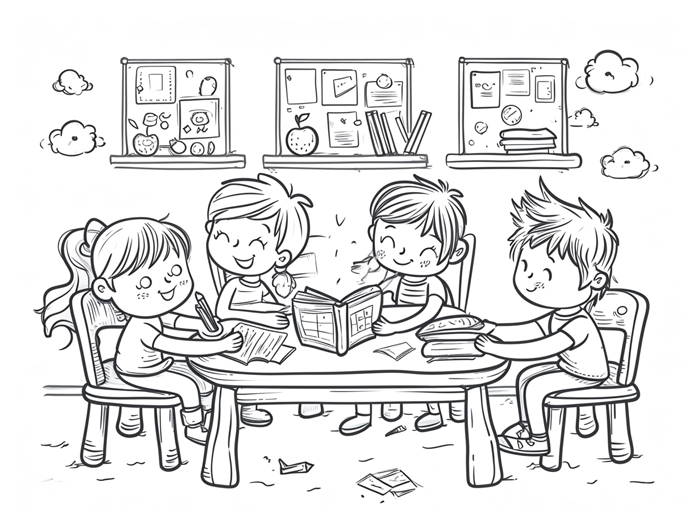
Synonyms for Children
When describing children, you can use a variety of adjectives to capture their different characteristics. Here are some synonyms that can be used to describe children in various scenarios:
| Adjective | Definition | Example Sentence |
|---|---|---|
| Energetic | Full of energy and enthusiasm | The children in the playground were energetic. |
| Playful | Lively and full of fun | The kids played together in a playful manner. |
| Curious | Inquisitive and eager to learn | The child’s curious nature made them ask many questions. |
| Imaginative | Creative and full of imaginative ideas | The little girl had an imaginative playtime with her toys. |
| Kind | Showing concern and consideration for others | The child was always kind and helpful to their friends. |
Antonyms for Children
To provide a balanced perspective, let’s also look at some antonyms ‚Äì adjectives that describe the opposite of certain characteristics in children. While it’s important to focus on positive attributes, it can also be helpful to recognize contrasting feelings or behaviors. Here are some antonyms that can be used to describe children:
| Adjective | Definition | Example Sentence |
|---|---|---|
| Shy | Timid or hesitant in social settings | The child was shy and preferred to play alone. |
| Quiet | Soft-spoken or making little noise | The baby was quiet during the nap time. |
| Serious | Showing maturity and solemn behavior | The young boy had a serious expression on his face. |
| Cautious | Careful and hesitant | The child was cautious when trying a new activity. |
| Inattentive | Not paying attention or easily distracted | The student was inattentive during class. |
Remember, as educators and caregivers, it’s important to focus on a child’s strengths and abilities while using descriptive adjectives. By shaping their perception of themselves through positive language, we can greatly influence their future success.
Now that you have a list of adjectives to describe children and examples of how to use them in sentences, you can enhance your teaching strategies and help children develop a wider range of vocabulary. Using the right adjectives will not only improve their language skills but also boost their confidence and self-esteem.
Continue reading to discover more tips and examples on effectively describing children in various scenarios without using a conclusion paragraph.
Conclusion
Describing children can be a powerful way to shape their perception of themselves and influence their future success. In this article, I have provided tips and examples on how to effectively describe children in various scenarios. We have explored adjectives for describing a child’s appearance, behavior, and personality, emphasizing the importance of using positive and age-appropriate language.
By using adjectives such as energetic, playful, curious, imaginative, and kind, we can highlight the unique qualities and strengths of children. Conversely, we can also consider antonyms like shy, quiet, serious, cautious, and inattentive to provide a balanced perspective.
As educators, it is our responsibility to guide and support children, focusing on their strengths and using positive language. By doing so, we can help shape their self-perception and foster a sense of confidence and self-worth. Remember, the words we choose to describe children have a profound impact on their development and future success.
So, let’s continue to use descriptive adjectives thoughtfully and purposefully, creating a positive and empowering environment for children to thrive.
